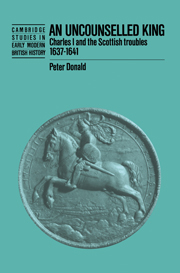Book contents
- Frontmatter
- Contents
- Preface
- List of abbreviations
- Note on the text
- 1 The king and his counsel
- 2 The king's troubles
- 3 The King's Commissioner
- 4 The king and war
- 5 A British problem
- 6 Parliaments and war
- 7 Projected settlements
- 8 An uncounselled king
- Bibliography of manuscript and printed primary sources
- Index
- Cambridge Studies in Early Modern British History
8 - An uncounselled king
Published online by Cambridge University Press: 20 October 2009
- Frontmatter
- Contents
- Preface
- List of abbreviations
- Note on the text
- 1 The king and his counsel
- 2 The king's troubles
- 3 The King's Commissioner
- 4 The king and war
- 5 A British problem
- 6 Parliaments and war
- 7 Projected settlements
- 8 An uncounselled king
- Bibliography of manuscript and printed primary sources
- Index
- Cambridge Studies in Early Modern British History
Summary
The title requires justification: it cannot be doubted that Charles I was intentionally a counselled king, and that his subjects likewise expected this. When it suited him, as it did in January 1626 over the Revocation or later in the preface to the Scottish liturgy, Charles boasted that he had taken counsel. Institutionally he appointed privy councils in each of his three kingdoms whose duty it was among other things to give him advice. In the privacy of his Court any who could gain access, whether member of the Household like the Marquis of Hamilton or visitor like the Earl of Nithsdale, had opportunities to speak out. After 1603 Scots with a distant king might argue very easily that policies ill pleasing them were the result of bad counsel given to a monarch who sadly was removed from the realities of the situation. If the king could do no wrong, then his servants, whether they had counselled him or not, were vulnerable to criticisms and attack. This reaction was not necessarily misplaced. Competition for the ear of the king was keen; rivalries and jealousies, popularly taken to be the stuff of life at Court, were often real; anglocentric policies could be supposed to have come from English advice. Can it be said that Charles was uncounselled – or only that he was wrongly counselled in the eyes of particular critics?
Just as in modern parlance an ill-advised action does not necessarily proceed from the steerings of a third party, there could be some ambiguity in attacks on the king's counsellors.
- Type
- Chapter
- Information
- An Uncounselled KingCharles I and the Scottish Troubles, 1637–1641, pp. 320 - 327Publisher: Cambridge University PressPrint publication year: 1990



